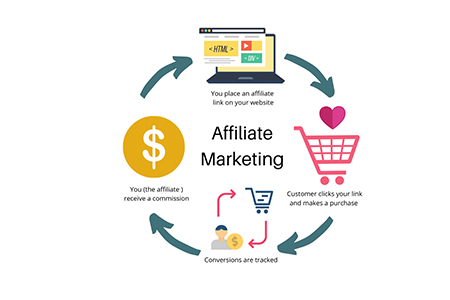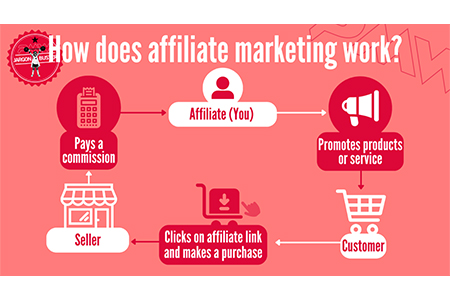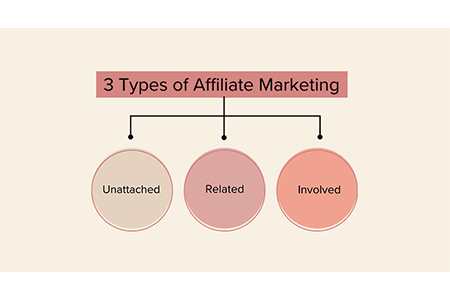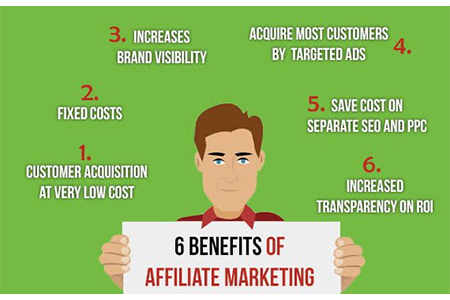Table Of Content
- 1. What is Affiliate Marketing and How Does it Work?
- 2. Key Players in Affiliate Marketing (Merchants, Networks, Consumers)
- 3. How Does Affiliate Marketing Work?
- 4. Types Of Affiliate Marketing
- 5. Benefits of Affiliate Marketing
- 6. How to Get Started with Affiliate Marketing
- 7. Best Affiliate Marketing Strategies for Success
- 8. Top Affiliate Marketing Programs to Consider
- 9. Common Challenges & How to Overcome Them
What is Affiliate Marketing and How Does it Work?
Performance-based advertisement is the basis of affiliate marketing. An affiliate displays a company's product or service to an audience for payment and earns commission if it leads to the sale of a product or a lead generation by virtue of exposure. This mutually beneficial arrangement connects affiliates and businesses with mutually connected interests in reaching out to consumers, hoping to generate revenues in passive income for both of them.
Key Players in Affiliate Marketing (Merchants, Networks, Consumers)
Affiliate marketing, on the other hand, involves cooperation between all mentioned players: merchants to sell certain products, affiliate networks to link partners, and customers to buy through the affiliates' promotions. Thus, a good dynamic ecosystem forms under which affiliate commission can be earned by linking products to the appropriate buyers.

How Does Affiliate Marketing Work?
Affiliate Links & Tracking
Affiliate marketing relies primarily on individual identified links that are embedded in its content. Once consumers click on the links and go on to purchase, the affiliate earns a commission. Tracking software guarantees that the affiliates are allocated those sales or leads they secure transparently and efficiently so they can get paid.
Commission Models: CPA, CPC, Revenue Share
Affiliate marketing commissions can take many possible forms: Cost Per Acquisition (CPA) pays the affiliate for every sale; Cost Per Click (CPC) earns the affiliate for traffic to its site; Revenue Share pays the affiliate a portion of the revenue generated from a referred customer. Each is suitable for different marketing strategies and goals.
The Role of Affiliate Networks
Affiliate networks are nothing but intermediaries linking merchants that are potential affiliates. They provide a platform to track their performances, manage the payments, and provide marketing materials to the partner affiliates. Via the streamlining of partnerships to these networks, affiliates have access to a wide array of opportunities and supports as they build and implement successful campaigns.

Types Of Affiliate Marketing
Unattached Affiliate Marketing
Unattached affiliate marketing does not select products or services to market on account of any sort of personal allegiance towards them. Affiliates will use generic ads (usually paid ones) and act impersonally, targeting a huge cross section of the public. This requires very little involvement but less conversion than personalized methods.
Related Affiliate Marketing
Related affiliate marketing would connect affiliates with products or services closely tied to the affiliates' content. Affiliates would typically promote products that they know about or that are related to their niche; hence, they are building audience trust. This targeted approach will have much higher conversion rates since consumers value the recommendation.
Involved Affiliate Marketing
Involved marketing occurs when affiliates promote services or products they have tested and genuinely believe in. Their endorsement thus becomes trustworthy, creating better involvement and greater trust among the audiences, resulting in higher chances of conversion as far as this particular method is concerned.

Benefits of Affiliate Marketing
Low Startup Costs & Passive Income Potential
Affiliate marketing can provide a low startup and overhead for anybody who might want to pursue it. An affiliate doesn't have to create the product or service, keep inventory, or handle any customer service aspects. Once started, it has the possibility of becoming a stream of passive income since an affiliate earns commissions for sales generated based on once created content.
Performance-Based Model
The performance-based Affiliate marketing ensures that the affiliates are actually compensated for sales and leads that they are doing, making it a risk free expenditure for the merchants and an incentive for the affiliates to improve their marketing efforts to generate maximum revenues.
Scalability for Businesses and Affiliates
Affiliate marketing offers a highly scalable phenomenon for all parties involved. The merchant can increase reach and leverage sales through the partnership with many affiliates. An affiliate can further work on promotional offerings in various niches or on different products to earn revenue from alternative sources. This business model hence is becoming flexible and scaling for all parties.

How to Get Started with Affiliate Marketing
Choosing the Right Niche and Audience
Finding the correct niche is number one in affiliate marketing. Affiliates should differentiate a narrow market along lines at which they feel passion and interest, learning how to create richness in the audience by creating compelling content. Thus, knowledge of the audience's needs will improve the targeting of promotions, which will improve the conversion rate.
Finding and Joining Affiliate Programs
First things first; research the most popular and trusted affiliate programs within your niche. Check if they have generous commission rates, functional tracking systems, and well-defined customer care services. You can now join their affiliate programs to benefit from exclusive offers and promote the products/services.
Creating High-Converting Content (Blogs, Videos, Social Media, etc.)
You need engaging content that is credible; blogs, videos, and social media are where bees buzz most these days; provide benefits worthy of your crowd and dollop appropriate affiliate links. Excellent content builds trust, attracts traffic, and encourages conversion because one brings commission to the other.
Promoting Affiliate Links Effectively
The affiliate link will drive you crazy every time they offer a review, tutorial, or social media post. It should have an outstanding record of understanding what this product can give the audience. Use call-to-actions and track performance to fine-tune your strategy for maximum conversions.

Best Affiliate Marketing Strategies for Success
SEO & Content Marketing
By SEO and content marketing, affiliates can have good chances for success. Affiliates can attract organic traffic to their websites designed with SEO by targeting relevant keywords. Good content will enhance engagement, build credibility, and finally convert. Thus, more people will use the affiliate links, bringing extra revenue.
Social Media & Influencer Marketing
The strength of social media and influencer marketing can never be overemphasized in affiliate marketing. An affiliate can use social media as a tool to inform a larger, more engaged audience. When influencers working in a related niche promote any affiliate link, this creates credibility and drives more traffic, leading to more sales.
Email Marketing & Lead Nurturing
Email marketing provides affiliates an avenue for relationship building and lead nurturing over time. By sending the prospect useful information and special offers through email marketing campaigns, the affiliate can help lead prospective buyers through the sales funnel, thus increasing the conversion rate and earning maximum affiliate revenue.
Paid Advertising & Retargeting
Paid advertising and retargeting reach potential customers effectively. Affiliates can do PPC campaigns to get targeted traffic to offers while also retargeting visitors who didn't convert. The strategies increase visibility and conversion rates, thus maximizing affiliate commissions.

Top Affiliate Marketing Programs to Consider
Amazon Associates
The most popular affiliate program is Amazon Associates, which gives access to millions of products stored at Amazon. With this vast marketplace, affiliates can easily relate to products for their audience, carry the weight of the trusted name, and get paid a better commission for sales referred.
ShareASale, Rakuten, CJ Affiliate
ShareASale, Rakuten, and CJ Affiliate are the big names in affiliate marketing networks that access various merchants to affiliates. These are the powerhouses of tracking systems and provide a wide range of products and commissions. An affiliate can find a variety of niches to suit his marketing style.
High-Ticket vs. Low-Ticket Affiliate Programs
High ticket affiliate programs pay out a large commission per sale but require more effort in order to convert. Low ticket affiliate programs, on the other hand, pay out small commissions per sale but can generate higher volumes of sales. Neither of these models has disadvantages; which one suits best depends on your strategy and audience engagement.

Common Challenges & How to Overcome Them
Low Conversion Rates & Click Fraud
This affiliate marketing low conversion rates, alongside click fraud, are some of the hardships. These can be overcome by making your content more relevant, improving targeting, and employing fraud detection. Track performance regularly to identify patterns and adjust accordingly to raise conversions.
Compliance with FTC Guidelines
Affiliate marketers must declare affiliate links under FTC guidelines. When endorsing affiliate products, always notify your audience. Such ethical practices will secure consumer trust, avoid legal complications, and safeguard your image.
Managing Affiliate Relationships
Affiliate relations should be nurtured for long-term success. Communicate with merchants, develop expectations, and track performance so that both will derive benefit. Trust will create unique opportunities for affiliates while improving partnerships.
Future of Affiliate Marketing in 2025 & Beyond
AI & Automation in Affiliate Marketing
Artificial intelligence and automation technologies are expected to change the practice of affiliate marketing. Such advanced tools can analyze data better, optimize campaigns, and personalize marketing efforts. Content creation and performance tracking will be done automatically, making the whole affiliate marketing process more economical and scalable.
Voice Search & Affiliate SEO Trends
The changes and influences of voice search are making fast inroads into affiliate SEO. Therefore, it's time for affiliates to optimize their content for voice queries, with an eye on natural-sounding phrases and long-tail keywords. This will give an edge to early converts in the field in capturing increasing search traffic, which will very soon deliver many conversions via voice-activated devices.
Emerging Affiliate Niches
Emerging categories like eco friendly products, health tech, and virtual services are bringing exciting new types of opportunities for affiliate marketers. Consumer interests are already shifting, and so are the opportunities for most affiliates in these growing niches to earn new demand, create lucrative partnerships, and deliver targeted promises to specialized offers.

FAQs
Earnings in affiliate marketing can be dependent upon the niche, the traffic to the offers, and the kind of commissions involved. A beginner may make only a few bucks, but a wise affiliate will know how to earn a handsome income. These wise affiliates build slowly but surely and eventually convert the whole thing into passive income.
Important traffic driving vehicles are: enough valuable content, search engine optimization, social media marketing, and paid advertising. If you keep promoting and engaging with your audience, your affiliate links will start receiving visibility and traffic as a consequence.
A website might be an asset in affiliate marketing, but it is not a necessity. You can promote products on social networks, through e-mail, or via video. Nonetheless, a website will give you more authority over your content and conversions.
When seeking the best programs to affiliate with, look for those that match your audience's interests. Find programs with reputable networks, good commissions, and strong-quality products. Also, make sure they have products your audience will trust.
Common issues include promoting products that have no relevance, failing to disclose one's affiliate links, neglecting SEO efforts, and cluttering content with ads. Focus instead on providing value, holding transparency, and giving sincere recommendations to your audience to avoid these pitfalls.



